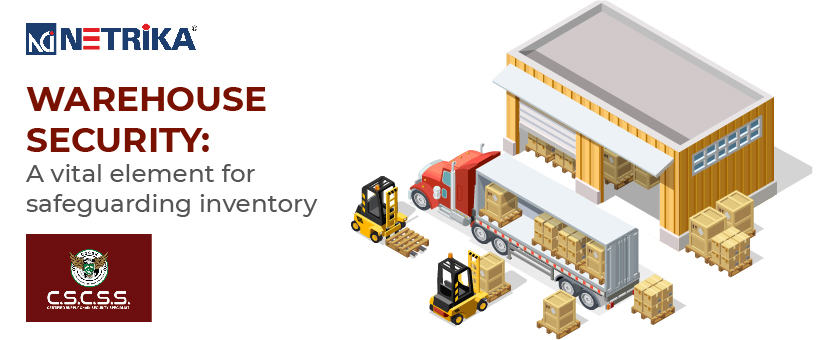Warehouse security management and measures adopted to improve its safety
- April 28, 2022
- Posted by: marketing@netrika.com
- Category: Blogs

Does your supply chain security render a fool-proof warehouse management control?
Do you ever question the accuracy and security of your organizational warehouse? Or, has your organization been on the receiving end of lost inventory, shrinkage, cargo theft, etc.? While we cite these issues, you must have a relating question of what inventory shrinkage or cargo theft and its likes do with warehouse security. Moreso, with the underreporting of cargo theft both domestically and internationally, you do not even get accurate statistics in the market, which would ring an alarm.
Before delving into the valid question, let us look slightly into warehouse management.
Warehouse management or security system is an approach that increases inventory management by optimizing inventory levels, reducing cycle time, and enhancing order fulfillment. This concept is designed to manage all the warehouse activities as part of supply chain security.
Warehouse management under supply chain security streamlines the inventory control to be more accessible, faster, and highly efficient. It offers quick feedback, enabling supply chain security specialists to respond faster and accurately. It makes the inventory process smooth, so wholesalers’ distributors know and record what and how much their warehouse has in store, making it easier to replenish those goods.
The Importance of Warehouse Security
While inventory theft is the prime focus of warehouse security management, cargo theft and inventory shrinkage are also unavoidable problems that stem from unmanaged supply chain security. While the cargo theft contributes to tens of billions of dollars, the exact record goes unreported due to security limitations.
Suppose your organization lacks a supply chain security system covering warehouse management control. In that case, it will give the thieves an easy way to steal inventory cargo or fabricate vulnerable holes in the system to make your warehouse immune to risks and theft. Moreover, if your customers or customers beyond your reach are willing to buy the stolen goods, these thieves will capitalize on your products, thus rooting you out of business in the long run.
This makes warehouse management of paramount importance in supply chain security. Many elements influence an organization to incorporate warehouse management as part of their supply chain security, such as:
● Customer Service and Tracking
Warehouse plays a crucial part in your client’s buying journey and experience. So, if the products ordered online or offline do not reflect available in stock in the warehouse, that demonstrates a breach of trust between the seller and customer. Therefore, the warehouse must have optimized inventory based on forecast data and stock after the client places the order.
● Company Productivity
Warehouse management is key to ensuring that the organization meets its productivity goals and reflects efficiency, quality control, time management, and consistency in the entire supply chain security process. Your warehouse plays a vital part in ensuring that your company meets its productivity goals.
● Return on Investment
If your organization has the correct warehouse management, it can help improve sales and eventually profits. The proper warehouse management helps you sell more, sell fast, and create happy customers, thus meeting the ultimate goals.
● ERP Integration
Supply chain security recommends that every warehouse management system integrates with the existing enterprise resource planning system to replicate the procedures and techniques. It helps your business grow while fitting it with the customer’s needs.
● Meet and Exceed Compliance Regulations
In a world run by digital means, businesses face complex challenges encompassing supply chain security and government regulations adherence. Warehouse management offers the right tools and techniques to businesses to stay afloat, giving the supply chain a competitive edge while complying with government regulations.
What is the ideal supply chain security arrangement for a warehouse?
Designing ideal supply chain security measures for warehouses requires attention to detail based on location, warehouse size, government regulations, and other elements. These elements can be:
● A separate design portion of physical partitions for receiving goods and dispatching the goods.
● A robust physical and digital guarding system for external people and employees based on the latest technology at the entrance and exit doors of the warehouse.
● Policy for trash scrap removal, which meets the government regulations.
● Using separate vehicle loading and unloading channels based on domestic, national, and international cargo selection.
● CCTVs installed in different sections (including blind spots) to live to monitor the external and internal activities of the warehouse.
● Integrate the supply chain security system with warehouse inventory management to inform and notify of any changes.
● A strategic warehouse space planning and optimization to enhance security measures.
● Visitor protection by disabling unauthorized visitors on the premises.
● The alarm system is deployed across the warehouse to keep any malicious activity, emergency or misadventure.
● Proper control and monitoring of outgoing shipments.
● Vehicle in and out an inspection to address malicious attempts of threat and risk.
What are the types of warehouse security measures?
1. Warehouse Lighting
Warehouse lighting seems to be a cliché warehouse security measure but is one of the most robust techniques to keep your warehouse protected against thieves. Poorly lit warehouses make it harder for organizations to identify and prevent fraudsters or even malicious insiders. These safety hazards, including on-site dangers, can be easily averted by simply using sufficient lighting.
2. Alarm Systems
Alarm systems are a crucial tool for counteracting potential thefts, thus minimizing the inventory loss in the warehouse; the alarm system deters security breaches by notifying authorities and the security response team of a potential threat.
3. Warehouse Security Cameras
Warehouse security cameras placed both inside and outside the premises act as a deterrent to potential threats, with the fear of being caught. Moreover, modern security cameras provide high-definition footage, broader area coverage, and the option of recording, uploading, and accessing the data offline. This prevents tampering with warehouse goods, information, and the cameras themselves.
4. Entryway Security Doors
The toughness of doors, locks, and windows is the prime measure for allowing or deterring a warehouse breach. So, make sure there are reinforced with solid components, durable door screws, deadbolts, etc., to prevent malicious entries.
5. Security Patrols
Security patrols provide on-site supply chain security to the warehouse by verifying the presence of intruders if any and disabling trespassers to minimize thefts.
6. Access Control Systems and Security Cages
Keep the inventory, especially the valuable ones, under high-security cages and surveillance to make it harder for malicious people to gain valuable hands-on goods.
7. Inventory Tracking
Keeping a track and trace inventory is an ideal measure to keep missing products in check and identify inventory shrinkage.
8. Background Checks on Warehouse Staff
Malicious insiders are a common contributor to inventory shrinkage. Therefore, before you entrust someone with your valuable documents, products, and supply chain security, it is only wise to vet new hires to manage and control risks.
While these elements are not the only supply chain security tools that can be used to protect the warehouse against risks, these measures can place your warehouse under maximum risk protection against malicious attempts, both online and offline.
How does Netrika assist the agility and adaptability in warehouse management under supply chain security?
Netrika, with its deep expertise in the physical and digital security trends and the skilled, certified forces to offer training in the domain, provides the CSCSS certification for professionals. We are a global leader in providing specialized training regimes from experts in the respective areas of specialization with broad industry exposure.
Our supply chain management courses allow the participant to gain professional visibility and credibility while enhancing their marketability and job security across the globe. With an instructor-led supply chain security certification, Netrika empowers and generates awareness of the evolving risk landscape and assists in professional growth while aiming at impending security risks.

